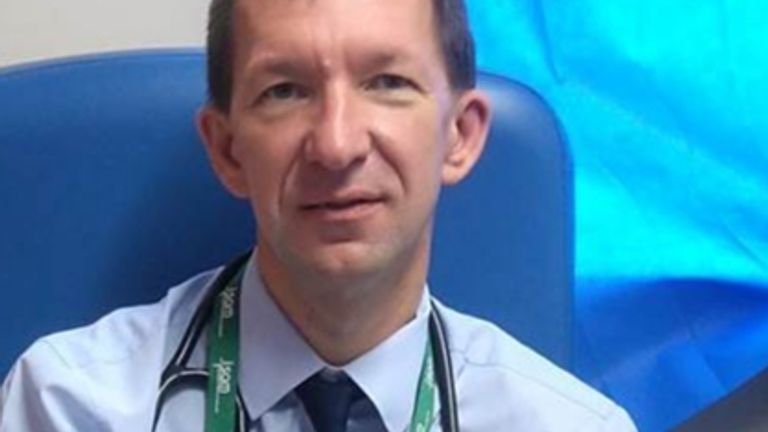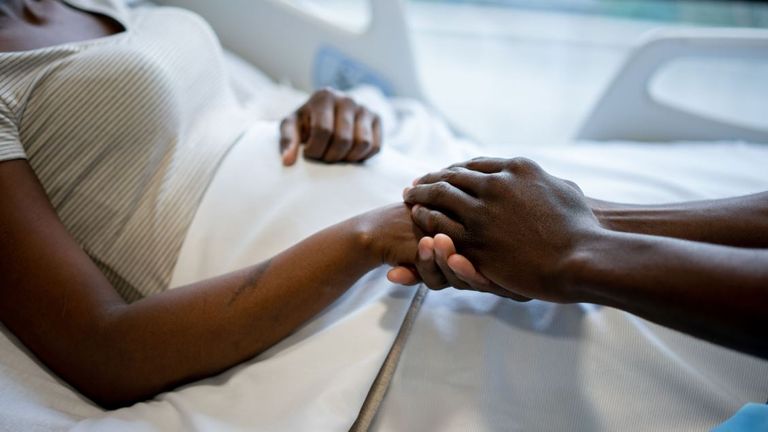Around three-quarters of medics in urgent and acute care believe hospitals are not prepared to cope over the next six months, a survey has found.
In addition, just under three-quarters (70%) believe they will not be able to provide the level of care they want over the same period.
The findings come from a snapshot survey conducted by the Society for Acute Medicine (SAM), which represents clinicians working in acute medical units across the UK.
Dr Nick Scriven, former president of SAM, said the NHS was already reaching a “tipping point” with rising admissions of COVID-19 patients – even before the “routine challenges of winter”, such as flu, norovirus and other illnesses.
He warned, despite the major role of acute medical units in easing the pressure off emergency departments by saving bed space, the specialist facilities were “at risk”.
The survey found that same day emergency care (SDEC) units were also being stretched.
SDEC units are designed to alleviate pressure on emergency departments and bed capacity by providing urgent care without the need for overnight stays.
Slightly over a third of those surveyed (34%) said SDEC was functioning effectively.
The limitations facing SDEC included reduced bed availability due to social distancing, admitted patients occupying beds and restricted staff numbers due to redeployment and sickness.
Dr Scriven said: “Acute medical units have been at the forefront of looking after probably the majority of those hospitalised with COVID-19, including delivering advanced respiratory care, so the views of our members are deeply concerning.”
He added, with ongoing COVID-19 work and rising rates of infections, hospitals’ workforces would be “pressed even harder”.
This lay at the root of concerns among medics for the next six months, alongside a lack of additional funding from government to boost acute medicine over winter, Dr Scriven said.
The Liverpool City Region is the only area in England to have currently been placed in Tier 3 of the government’s new three-tier system – meaning it has had the strictest rules imposed.
This means pubs and bars not serving meals have to be closed, along with a bans on people socialising with other households indoors and in private gardens.
Paul Brant, cabinet member for adult health and social care at Liverpool City Council, said intensive care capacity in the city is more than 90% full – with coronavirus patients making up an increasing proportion of those being treated.
He told BBC Radio 4’s Today programme: “Our intensive, critical care beds are filling up very fast.
“The most recent figures I’ve seen suggest they are over 90% full and our acute hospital trusts have occupancy levels of COVID-positive patients of over 250.
“At the current rate of increase, we would expect Liverpool to surpass the peak of the first wave probably within the next seven to 10 days.”
He added: “It has become clear that the intensity of the demand on hospital services here in Liverpool is crowding out anything other than dealing with COVID.”
:: Subscribe to the Daily podcast on Apple Podcasts, Google Podcasts, Spotify, Spreaker
On Tuesday, other UK hospitals warned they were going to stop routine operations in order to cope with the increasing demand from COVID-19 patients.
University Hospitals Plymouth NHS Trust said it has, for the meanwhile, stopped non-critical planned surgeries at its Derriford Hospital – but will still go ahead with day procedures.
Victoria Eaton, Leeds director of public health, said hospitals there are “very close” to cancelling non-COVID services, and units may struggle with minimal staff numbers to fill the NHS Nightingale hospitals. which are on standby.
In Northern Ireland, Belfast Health Trust have cancelled all elective procedures this week to deal with the growing number of people going to hospital with COVID-19.


